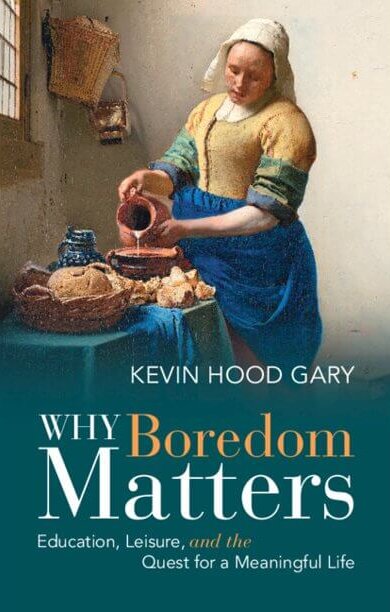Living in an Age of Boredom

We in the United States have lived in an age of material comfort and relative geopolitical peace for almost eighty years. While there have been wars and protests, there has not been an existential threat to our country since World War II and the Great Depression. But instead of seizing this opportunity to cultivate character and renew our culture, we have “amused ourselves to death” by making life comfortable and boring.
Kevin Hood Gray recognizes this problem and wants to do something about it. Rather than trying to find “a technical and permanent solution” to the problem of boredom, Hood calls for a middle way of leisure since boredom ultimately is a “problem of the self.” A Professor of Education at Valparaiso University, Hood illuminates how boredom is an existential and moral problem and is a particular challenge for education.
The problem of boredom is examined philosophically in chapters two and three, where Hood invokes Heidegger and Kierkegaard. Boredom as a term emerges in the nineteenth century—a middle term between acedia, on the one hand, and melancholy, on the other. For Heidegger, boredom is to experience the barrenness of a situation, to grope for anything to occupy oneself with, and to discover a loss of agency. It is a specific mood or anxiety where the possibility of new knowledge is foreclosed, and it is something we recognize only after the fact.
This realization, in turn, prompts us to a quest for authenticity to get us out of this existential impasse. If we don’t, we spiral downward into moral despair, as Kierkegaard describes. Boredom thus becomes a moral problem—borne out of weakness of character and shallow spirituality. According to Hood, we need to strike the right balance between our desire for infinite possibilities and what the necessities of life demand to escape this condition. This may come in the imagination of a better self and world, as in the case of Augustine and Simone Weil, a recognition that agency is within one’s power to grasp and understand the truth.
Leisure is the cure to boredom for Hood, as defined by Aristotle, Aquinas, Pieper, Marion, and others in contemplating the truth. It is a receptive approach to the world where we can imagine possibilities past utilitarian concerns. In the words of Hood, it is a state of being that “involves an intense practice of self-examination that cultivates true freedom by guarding against idleness, compulsive busyness, and pointless desires.”
The cultivation of leisure includes a receptive attitude towards reality, being at ease with the world, and activities that require discipline and persistence. In education, teachers need to trust their students, and students need to perceive school as a type of apprenticeship into leisure where a spirit of study and educational epiphanies are encouraged and valued. In this sense, Hood’s recommendations resemble those in Sean Steel’s Teacher Education in the Pursuit of Wisdom and The Pursuit of Wisdom and Happiness in Education.
But one wonders in our technologically saturated age of smartphones, social media, and endless entertainment whether such an education is possible in America today. Assuming you don’t want to live off the grid, do parents have the wherewithal to withhold technology from their children, much less from themselves? Are we doomed to live in an age of boredom with a constant bombardment of likes, clicks, and videos? By returning to an older conception of living—leisure—Hood believes we can. I’m not so sure I share that optimism.




